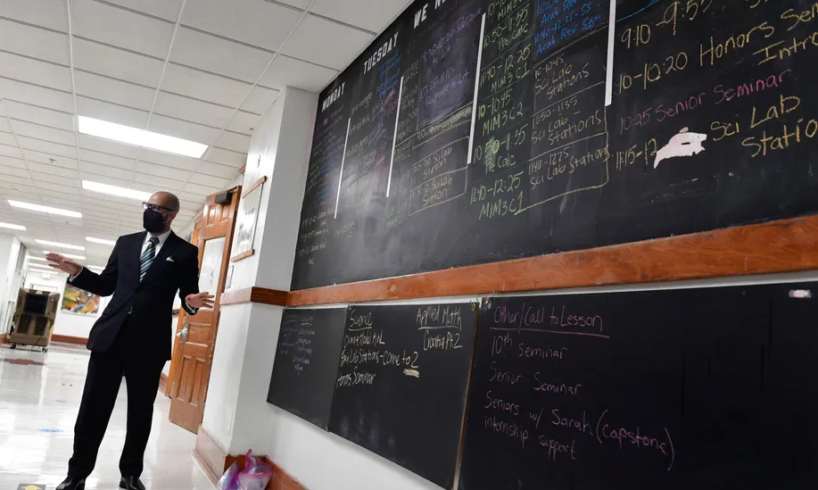
As enrollment declines in Denver Public Schools, the superintendent said he will shrink the size of the central office, freezing some vacant positions and reducing the number of executive-level positions. Many senior leaders will have to reapply for their jobs, “with an eye toward being more effective, being more efficient, and reducing positions,” Superintendent Alex Marrero said.
The goal, he said in an email to staff Tuesday, is to drive more district dollars directly to schools, something school board members also said they wanted to do in last fall’s election. However, in an interview, Marrero said the decision was solely his.
Colorado districts are funded per-pupil, which is how Denver funds its schools as well. If a school loses students, its budget shrinks. With districtwide enrollment expected to decline 6% by 2025, Marrero said the impending central office cuts are meant to mirror that.
“Because DPS enrollment is declining, the responsible course of action is to find ways to reduce the central budget to adjust and maintain efficiency, as a school budget does,” he said in his email to staff.
Vacant positions at the manager level or above will be frozen immediately, Marrero said. More information about the reorganization and reduction of executive-level central office jobs will be announced “in the next few weeks,” he added. The central office employs a wide range of employees, from secretaries to administrators.
Critics have long complained that Denver’s central office is bloated. A Chalkbeat analysis of data from the 2016-17 school year found that the district was top-heavy compared to the statewide average. The teachers union lodged the same complaint during a 2019 strike, arguing the district should cut central office positions in order to increase pay for teachers.
After the strike, then-Superintendent Susana Cordova cut more than 220 positions from the central office and added some new ones for a net reduction of about 150 positions. The cuts, which freed up $17 million, were meant to funnel more money to teacher salaries and eliminate redundancies in the central office, Cordova said at the time.
In his email to staff, Marrero said that when compared to similar-sized urban school districts, Denver still “expends a disproportionate share of resources on middle management to executive-level positions.”
That conclusion is based on his own lived experience as an administrator in New York, where he worked before coming to Denver last year, comparisons he conducted, and conversations with colleagues around the country, Marrero said in an interview.
Concerns that the central office is too big also surfaced during the 100-day listening tour he did last year, Marrero said. At the same time, he said he heard from central office employees who say that’s not true and they’re stretched thin.
Some divisions within Denver’s central office are “right in sync” with similar-sized districts, Marrero said, but there are “inefficiencies and redundancies” in others. Cuts to the central office would “achieve a laserlike focus on what matters most,” he said in his email to staff.
Central office employees have twice been deployed to schools during the pandemic to act as substitute teachers or supervise lunch or recess. The most recent time was last month, when school staffing was near a breaking point due to skyrocketing omicron cases.
Central office employees did the same during the strike in 2019. Some have said they feel disrespected by teachers and others who criticize their positions as non-essential while at the same time requesting they fill in at schools even if they don’t have a teaching background.
Marrero acknowledged that sentiment. He attributed some of the tension between school-based and central office employees to a misconception that everyone who works at district headquarters is an executive, when in fact some are paid less than school employees.
“Central does get unfairly treated in the court of public opinion,” Marrero said. “That comes with folks not understanding how a district runs.”
Marrero is in the midst of writing a “next generation, multi-year,” strategic plan for the district, which he said in his email will “identify and address other inefficiencies.” But it’s not expected to be completed until May 2022, and Marrero said the central office cuts would come sooner.
He said the district has commissioned a study from a non-profit group called Education Resource Strategies to “help us imagine how our resources can be marshaled to maximize the benefit to student and team member success and well-being.” The study should be complete by the end of the month, Marrero said.
This article was originally posted on Denver district will cut jobs in its central office, superintendent says